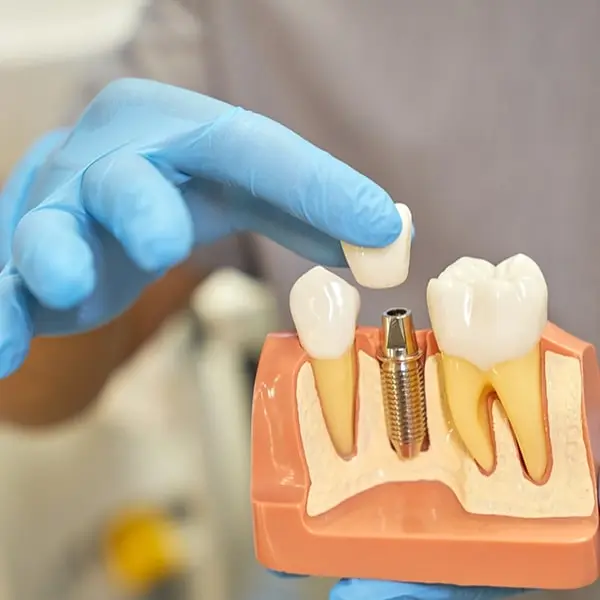Single-day dental implants are a relatively new dental procedure that involves the implantation of dental implants into the jawbone on that day as the extraction of the tooth. The procedure is popular because it is less invasive and causes less pain than traditional implant procedures, which require multiple visits to the dentist. Magnum Clinic offers same day dental implants in Dubai. Talk to our Implantologist today.

Dental implants are artificial tooth replacements that are inserted into the jawbone. They are made of titanium, which is biocompatible, meaning that it is compatible with the body. The implant is anchored in the jawbone and a crown is attached to the implant to replace the missing tooth. We offer same day dental implants in Jumeirah, DSO, and JVC in Dubai.
The jawbone typically deteriorates and recedes over time, which can cause teeth to become loose and eventually fall out. Dental implants are a permanent solution to this problem. They are made of titanium, which is biocompatible, meaning that it is compatible with the body's natural tissues. The implant is surgically placed in the jawbone, and a dental crown is then attached to it. Single-day dental implants offer the convenience of restoring your smile in a short timeframe, minimising multiple visits. Whether for a special occasion or a swift solution, our same-day option at Magnum Clinic provides a quick and efficient way to regain your dental function and confidence.
The procedure for dental implants is a surgical one. First, the dentist will examine the patient's mouth and determine if they are a candidate for implants. If they are, the dentist will then take an impression of the patient's mouth so that a dental implant can be created specifically for them. Once the implant is created, the dentist will then make an incision in the gum tissue and surgically place the implant into the jawbone.
The question of whether or not to ignore dental implants is a complicated one. On the one hand, dental implants are a relatively new technology, and there is not yet a great deal of evidence to support their long-term efficacy. On the other hand, they are a relatively expensive treatment option, and many people may not be able to afford them. Ultimately, the decision of whether or not to ignore dental implants will depend on a variety of individual factors.
There are three types of dental implants: endosseous, subperiosteal, and transosteal. Endosseous implants are the most common type, and they're placed directly into the jawbone. Subperiosteal implants are placed on top of the jawbone, and transosteal implants go through the jawbone and attach to an implant on the surface of the skin.
Dental implants are a great way to replace missing teeth, but they require some special post-treatment care. Here are the instructions:
1. Keep your mouth clean. Be sure to brush your teeth and gums twice a day, and use a rinse designed for dental implants.
2. Avoid hard or crunchy foods. They can damage your implants.
3. See your dentist regularly.
The cost of single-day dental implants can vary depending on the location and type of implant in Dubai. Generally, they cost more than traditional dental implants, but less than full mouth reconstruction. Most dental insurance policies do not cover the cost of implants, but some may cover part of the cost. Patients should ask their dentist for a detailed quote based on their specific needs. Call Magnum Clinic to book a consultation for same day dental implant in Dubai.




















Looking for a dental clinic near me? From routine check-ups to advanced treatments, our dental specialists are dedicated to providing exceptional dental care in Dubai.
